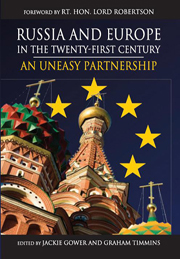Book contents
- Frontmatter
- Contents
- List of Contributors
- Acknowledgements
- List of Abbreviations/Acronyms
- Foreword Russia and Europe
- Preface
- Introduction Russia and Europe: What Kind of Partnership?
- PART 1 Russia looking West
- PART 2 Europe looking East
- PART 3 Partnership in Practice
- Chapter 13 EU-Russia Political Relations: Negotiating the Common Spaces
- Chapter 14 The Economic Relationship between Russia and the EU: History and Prospects
- Chapter 15 Russia and the European Security Governance Debate
- Conclusion Russia and Europe: An Uneasy Partnership 289
- Index
- More Titles in this series
Chapter 15 - Russia and the European Security Governance Debate
from PART 3 - Partnership in Practice
Published online by Cambridge University Press: 05 March 2012
- Frontmatter
- Contents
- List of Contributors
- Acknowledgements
- List of Abbreviations/Acronyms
- Foreword Russia and Europe
- Preface
- Introduction Russia and Europe: What Kind of Partnership?
- PART 1 Russia looking West
- PART 2 Europe looking East
- PART 3 Partnership in Practice
- Chapter 13 EU-Russia Political Relations: Negotiating the Common Spaces
- Chapter 14 The Economic Relationship between Russia and the EU: History and Prospects
- Chapter 15 Russia and the European Security Governance Debate
- Conclusion Russia and Europe: An Uneasy Partnership 289
- Index
- More Titles in this series
Summary
Introduction: The Evolution of European Security Governance
Security governance can be defined as the coordinated management of issues by multiple and separate authorities. As applied to Europe, its most obvious formal characteristic is the development of dense patterns of multilateralism and institutionalization. This feature does not negate the continuing relevance of the state-as-actor but it clearly suggests that this actor is, to an important degree, subordinated to institutional imperatives and processes of cooperation, as well as subject to a normative discourse on the appropriate principles of order. Governance of this type was not absent in Europe during the Cold War, however, since the late 1980s it has both ‘widened’ and ‘ deepened’. Security governance has come to acquire a pan-continental (rather than a bipolar) quality that involves overlapping interactions among a range of state, institutional and private actors in multiple security-relevant issue areas. At both analytical and policy levels the conceptualization and operationalization of security governance can be disputed; however, what seems eminently clear is that European order is now as much about institutions and norms as it is statecentric concerts, balances of power, and the conduct and settlement of war.
The development of Europe's security governance has occurred against a backdrop of policy-driven controversies concerning the appropriate roles and hierarchy of security institutions. For two to three crucial years after 1989 this came in the guise of the so-called ‘ architecture’ debate concerning the relative merits of NATO, the then Conference (now Organization) on Security and Cooperation in Europe (CSCE/OSCE) and the post-Maastricht European Union (EU).
- Type
- Chapter
- Information
- Russia and Europe in the Twenty-First CenturyAn Uneasy Partnership, pp. 267 - 288Publisher: Anthem PressPrint publication year: 2007



